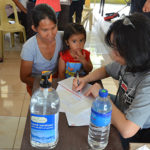DALLAS—Intercultural Christians know the language and customs to connect with their own people. And the Baptist General Convention of Texas is giving them an opportunity to use their knowledge to share the gospel with a culture they know inside and out.
|
Sudha Jayaprabhu (left) stands with one of the church planters trained through the funds she received from the Intercultural Strategic Partners. Jayaprabhu was able to spend three months in her native country of India training seven pastors. Through these efforts, 49 villages in the area will hear the gospel this semester. (PHOTOS/BGCT)
|
Many intercultural Christians in Texas have a passion to reach their own people back in their native lands. The BGCT Intercultural Ministries is helping to make that possible through a new Intercultural Strategic Partners initiative.
After nearly three years of planning, the BGCT Intercultural Ministries office and a board of seven intercultural pastors ministering in Texas formed Intercultural Strategic Partners.
With $65,000 allotted from worldwide church-directed cooperative giving, the BGCT launched the initiative to provide support for the work of indigenous Christians.
“It is high time we start trusting local missionaries and raising indigenous missionaries from local people due to the financial cost and the time,” said Bedilu Yirga, pastor of the Ethiopian Evangelical Baptist Church in Garland and a board member of Intercultural Strategic Partners. “We have an urgent message to share. With indigenous missionaries, you don’t have to spend the time to teach culture.”
Patty Lane, director of BGCT Intercultural Ministries, said Intercultural Strategic Partners is about backing intercultural leaders and letting them use their knowledge, ingenuity and connections to further the gospel in their homelands.

A core group of believers stands by the church planter (center). They became followers of Jesus through the church planters work and will serve as a nucleus for new churches in the area, according to Patty Lane, director of BGCT Intercultural Ministries. (PHOTOS/BGCT)
|
“It’s really about connections and indigenous strategies,” Lane said. “We are letting the indigenous leaders living here in Texas call the shots. What they go and do matches with what the local group needs. It’s about connectivity. The connections are already there. It’s a matter of seed money and a person who can bless and validate the work there in their home area.”
Since the beginning, Intercultural Strategic Partners has funded seven projects involving church planting, church planter training, orphan relief, medical missions and community development and education in Africa, South East Asia, South Asia and Eastern Europe.
Sign up for our weekly edition and get all our headlines in your inbox on Thursdays
In May, Intercultural Strategic Partners approved funding for Sudha Jayaprabhu, an Indian Christian living in North Texas more than 20 years.
Jayaprabhu spent the summer in her hometown in India encouraging seven national pastors and training them in church planting. Each pastor will minister to seven villages, working to share the gospel by starting core Bible study groups.
Intercultural Strategic Partners funding helped with the training, as well as providing bicycles for the pastors so they can travel from village to village sharing the gospel and encouraging other Christians.

These three people became followers of Jesus through a church planter trained by Sudha Jayaprabhu (not pictured) to be part of a seven-person core group that ministers to 49 villages in their home area of India. Now they are part of a core group that helps one of the church planters share the gospel with villages in their area. (PHOTOS/BGCT)
|
Yirga and his church also received funds from Intercultural Strategic Partners to help with church planting and community ministries in his home county of Ethiopia. Through Yirga’s connections and networking with ministries and pastors there, he is able to support and train 23 indigenous missionaries for only $60 per person per month.
“It’s very much encouraging, because we are receiving reports from the field,” Yirga said. “It is a blessing to hear that so many people heard the gospel for the first time, and we have people committing their lives to Jesus. We want to be culturally sensitive to the work out there and to engage ethnic churches in mission work and to be good stewards of what we have been given.”
Yutaka Takarada, pastor of the Japanese Baptist Church of North Texas in Dallas and an Intercultural Strategic Partners board member, agrees the new initiative is helping further and improve ministry that is already in place in their home countries.
“Some of the leaders from different countries are already working with the people from their countries, like starting churches or sending missionaries or educating pastors in that country,” Takarada said. “The ISP enlarges the ministry we already have done (in a few places) because we can do more with the financial support of the ISP.”
To receive support from Intercultural Strategic Partners, individuals and churches must complete an application to state their intentions for the funding. Qualified projects must be focused on growing the kingdom of God, be connected to a BGCT-affiliated intercultural church, involve local Christian leadership in an indigenous setting, be within the financial capability of Intercultural Strategic Partners and state an accountability process.
Once the application is submitted, the board meets once a month to discuss the proposed project. The board does not vote on the endeavors but continues discussion until a consensus is made. Lane said this approach has allowed the Holy Spirit to guide the group’s decisions in the best way possible.
“It helps us be more sensitive to God’s leadership and build trust with others in the group,” Lane said. “It’s done more on a relationship basis than a time-efficiency basis. We need to build the relationships and that helps us be effective as a group.”
Current projects deal with intercultural individuals and churches partnering with indigenous believers, churches and missionaries in their home countries. The board would like to see intercultural churches as well as Anglo churches taking advantage of the wisdom and cultural knowledge that each congregation possesses to form cross-cultural ministry projects.
“ISP links cultural knowledge and missional strategy to change the way we think about and do missions,” Lane said. “Creativity in strategy and innovation in networking are proving that even very limited financial resources in the hands of the right people will change the world. I hope that every intercultural church that has a heart and passion to reach their people around the world knows they have a friend at ISP.”
To learn more about Intercultural Strategic Partners, contact the BGCT Intercultural Ministries office at (888) 244-9400.














We seek to connect God’s story and God’s people around the world. To learn more about God’s story, click here.
Send comments and feedback to Eric Black, our editor. For comments to be published, please specify “letter to the editor.” Maximum length for publication is 300 words.